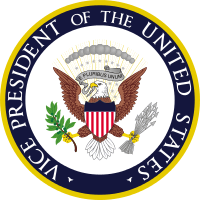Schuyler Colfax
| Schuyler Colfax | |
|---|---|
 | |
| 17th Vice President of the United States | |
|
In office March 4, 1869 – March 4, 1873 | |
| President | Ulysses S. Grant |
| Preceded by | Andrew Johnson |
| Succeeded by | Henry Wilson |
| 25th Speaker of the U.S. House of Representatives | |
|
In office December 7, 1863 – March 3, 1869 | |
| President |
Abraham Lincoln Andrew Johnson |
| Preceded by | Galusha A. Grow |
| Succeeded by | Theodore M. Pomeroy |
| Member of U.S. House of Representatives from Indiana's 9th district | |
|
In office March 4, 1855 – March 3, 1869 | |
| Preceded by | Norman Eddy |
| Succeeded by | John P. C. Shanks |
| Personal details | |
| Born |
Schuyler Colfax Jr. March 23, 1823 New York City, New York |
| Died |
January 13, 1885 (aged 61) Mankato, Minnesota |
| Political party | Republican (After 1855) |
| Other political affiliations |
Whig (before 1854) Indiana People's Party (1854) |
| Spouse(s) |
Evelyn Clark Colfax Ellen Maria Wade Colfax |
| Children | Schuyler Colfax III |
| Signature |
|
Schuyler Colfax Jr. (/ˈskaɪlər ˈkoʊlfæks/; March 23, 1823 – January 13, 1885) was a journalist, author, editor, newspaper owner, continental traveler, iron company executive, United States Representative from Indiana (1855–69), Speaker of the House of Representatives (1863–69), and the 17th Vice President of the United States (1869–73). To date, he was one of only two Americans (John Nance Garner in the 20th century being the other) to have served as both House speaker and vice president.
Colfax was known for his opposition to slavery while serving in Congress, and was a founder of the Republican Party. As Speaker of the House, Colfax voted for passage of the Thirteenth Amendment in January 1865. After winning the presidential election of 1868, President Ulysses S. Grant and Vice President Colfax, at ages 46 and 45, were the youngest Presidential team elected in the 19th Century.
An 1873 Congressional investigation into the Crédit Mobilier scandal named Colfax as one of the members of Congress (mostly Republicans), who likely received payments of cash and discounted stock from the Union Pacific Railroad in exchange for favorable action during the construction of the First Transcontinental Railroad. Denied renomination in 1872, Colfax left the vice presidency in 1873 and never again ran for office. Afterwards he worked as a business executive and became a popular lecturer and speech maker.
Colfax died in Mankato, Minnesota on January 13, 1885 while changing trains as he was en route to Huron, Dakota Territory on business for the Independent Order of Odd Fellows, of which he was a prominent member.
Early life and education

Schuyler Colfax was born on March 23, 1823 in New York City to Schuyler Colfax Sr. (born August 3, 1792), a bank teller, and Hannah Delameter Stryker, who had married on April 25, 1820.[1] His grandfather, William Colfax, served in George Washington's Life Guard during the American Revolution, became a general in the New Jersey militia and married Hester Schuyler, a cousin of general Philip Schuyler.[2][1] William was commander at Sandy Hook during the War of 1812.
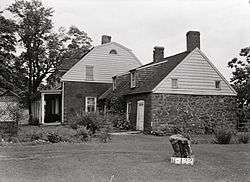
Colfax's father contracted tuberculosis and died on October 30, 1822, five months before Colfax was born.[1] His sister Mary died in July 1823, 4 months after he was born. His mother later remarried, becoming the wife of George W. Mathews.[1] Colfax's mother and grandmother ran a boarding house as their primary means of economic support. Colfax attended private schools in New York City until he was 10, when family financial difficulties ended his formal education and caused him to take a job as a clerk in the store owned by his stepfather.[1][3]
In 1836 Colfax's family moved to New Carlisle, Indiana. In 1841 Mathews was elected St. Joseph County Auditor, and he appointed Colfax as his deputy, a post which Colfax held for all eight years Mathews served as auditor.[1]
Newspaper editor
Colfax became interested in journalism and covered the Indiana Senate for the Indiana State Journal.[1]In 1845 Colfax purchased the newspaper and changed its name to the St. Joseph Valley Register.
In addition to covering the Indiana Senate, Colfax contributed articles on Indiana politics to the New York Tribune, leading to a friendship with its editor, Horace Greeley. At 19 Colfax became the editor of the pro-Whig South Bend Free Press. He owned the Register for nine years, at first in support of the Whigs, then shifting to the Republican Party after its founding in the 1850s.[4]
Marriages and family
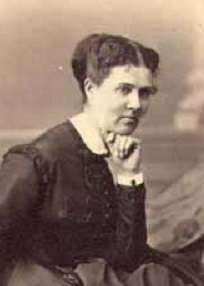
Wife of Schuyler Colfax
On October 10, 1844 Colfax married childhood friend Evelyn Clark. She died childless in 1863. On November 18, 1868, two weeks after he was elected vice president, Colfax married Ellen (Ella) M. Wade, a niece of Senator Benjamin Wade. They had one son, Schuyler Colfax III (1870-1929), who served as mayor of South Bend, Indiana from 1898 to 1901.[5]
Whig Party delegate
Colfax was a delegate to the 1848 Whig National Convention. He was also a delegate to the state constitutional convention of 1849-50. Colfax was the 1852 Whig nominee for Congress in the district which included South Bend, but narrowly lost to his Democratic opponent.
Beta Theta Pi
In 1854 Colfax was initiated into the Beta Theta Pi fraternity at DePauw University, an achievement remarkable for the fact that he had not attended college.[6]
U.S. Congressman (1855–69)
In 1854 Colfax ran for Congress again; the Whig Party was on the verge of collapse, and Colfax won election as a candidate of the short-lived the Indiana People's Party, an anti-slavery movement which formed to oppose the Kansas–Nebraska Act. Colfax served seven terms, March 4, 1855 to March 3, 1869. He was as chairman of the House Committee on Post Offices and Post Roads from 1859 to 1863. From 1863 to 1869 he served as Speaker of the House.
Know Nothing party affiliation
In 1855 Colfax considered joining the Know Nothing Party because of the antislavery plank in its platform. He was selected without his knowledge to be a delegate to the party's June convention, but had mixed feelings about the party and subsequently denied having been a member. Although he agreed with many Know Nothing policies, he disapproved of its secrecy oath and citizenship test. By this time of his 1856 campaign for reelection the Republican Party had formed as the main anti-slavery party, and Colfax became an early member.[7]
Opposed slavery
Colfax was identified with the Radical Republicans in Congress, and was an energetic opponent of slavery. His speech attacking the pro-slavery Lecompton Legislature in Kansas was printed in pamphlet form, and became the most widely requested Republican campaign document in the 1858 mid-term elections.
Civil War
Visited General Frémont in St. Louis
At the start of the American Civil War General John C. Frémont commanded Union Army forces in St. Louis Missouri.[8] On September 14, 1861 Colfax visited Frémont and petitioned him to send troops to capture Confederate General Sterling Price's forces in Kentucky. Colfax believed Frémont had 20,000 troops under his command in St. Louis. Frémont informed Colfax that he only had 8,000 troops in St. Louis and was unable to spare any.[8] In addition Frémont told Colfax that federal authorities in Washington had requested him to dispatch 5,000 of his troops elsewhere. Colfax suggested that Frémont reply that he could not spare any troops or Missouri would be lost to the Confederacy. Frémont declined, recognizing that he had a reputation for being insubordinate, and not wanting to appear unwilling to follow the instructions of his superiors in the Lincoln administration.[8]
Elected Speaker of the House
In 1862, following the electoral defeat of House Speaker Galusha Grow, Colfax was elected Speaker of the House.[9]
Announced passage of Thirteeth Amendment
On January 31, 1865 Colfax announced the passage of the Thirteenth Amendment in 1865. Though it is unusual for a Speaker to vote, directed the clerk to call his name after the roll call had been taken. He then cast the final vote in favor of the amendment, which abolished slavery throughout the United States and territories, to much applause from its supporters in the House.[10]
Reconstruction
Western travels
In 1865, Colfax, along with author Samuel Bowles and Lieutenant-Governor of Illinois William Bross, set out across the western territories from Mississippi to the California coast to record their experiences. They compiled their observations in an 1869 book called Our New West. Included in their book were details of the views of Los Angeles, with its wide panorama of vast citrus groves and orchards, and conversations with Brigham Young.
Election of 1868

During the 1868 Republican Convention the Republicans nominated Ulysses S. Grant for president.[9] Colfax was selected for vice president on the fifth ballot.[11] Colfax was popular among Republicans, known for his friendly character, party loyalty, and his Radical views on Southern Reconstruction.[11] Among Republicans he was known as "Smiler Colfax".[11] Grant won the general election and Colfax was elected the 17th Vice President of the United States.[11][9]
Vice President (1869-1873)
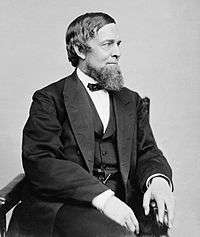
Colfax was inaugurated March 4, 1869, and served until March 4, 1873. Grant and Colfax, 46 and 45 respectively at the time of their inauguration, were the youngest presidential and vice presidential team until the inauguration of Bill Clinton and Al Gore in 1993.[12]
Election of 1872
Prior to the 1872 Presidential Election, Colfax believed that Grant would only serve one term as President.[11] In 1870 Colfax announced he would not run for political office in 1872.[11] Colfax's announcement failed to garner prominent support among Republicans for a presidential bid, as he had planned, while Grant decided to run for a second term.[11] In addition, The Liberal Republican interest in Colfax as a possible presidential candidate alienated him from Grant and the regular Republicans. (The Liberal Republicans believed that the Grant administration was corrupt and were against Grant's attempted annexation of Santo Domingo.)[11] Colfax became a candidate for the Republican vice presidential nomination by informing his supporters that he would accept the nomination if it was offered.[11] However, Colfax's previously stated intent not to run for office in 1872 created the possibility of a contested nomination, and Senator Henry Wilson defeated Colfax by 399.5 delegate votes to 321.5.[11] Grant went on to win election to a second term, and Wilson became the 18th Vice-President of the United States.[11]
Crédit Mobilier scandal (1872-1873)
In September 1872, during the presidential election, Colfax's reputation was marred by a New York Sun article which indicated that he was involved in the Crédit Mobilier scandal. Colfax was one of several Representatives and Senators (mostly Republicans), including nominated Vice Presidential candidate Henry Wilson, who were offered (and possibly took) bribes of cash and discounted shares in the Union Pacific Railroad's Crédit Mobilier subsidiary from Congressman Oakes Ames in exchange for votes favorable to the Union Pacific during the building of the First Transcontinental Railroad. Colfax initially denied involvement to the press. A Congressional investigation in January 1873 revealed that Colfax in 1868 had taken a $1,200 gift check for 20 shares of Crédit Mobilier stock from Ames. At the end of the investigation in February 1873, Colfax was not censured or forced to resign, mainly because the incident took place during his tenure as Congressman, and because he was scheduled to leave office the following month.[13] In addition to Colfax's involvement in the Crédit Mobilier scandal the investigation revealed that Colfax had received a $4,000 gift in 1868 from a contractor who supplied envelopes to the federal government while Colfax was chairman of the Committee on Post Offices and Post Roads.[13] His career ruined, Colfax left office under a cloud at the end of his term in March, while he never ran for public office again.[9][14][13] Throughout the investigation and after leaving office Colfax continued to deny taking Ames' $1,200 check while getting support from his personal associates.[1]
Lecturer and iron company Vice President
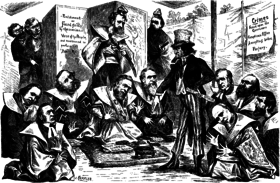
Even after leaving office in 1873, Colfax's reputation remained damaged as he continued to defend himself against charges of corruption in the Crédit Mobilier scandal and from the Congressional investigation that followed. On March 8, 1873 Frank Leslie's Illustrated Newspaper published a political cartoon by Joseph Keppler that depicted Uncle Sam advocating Colfax commit Hari-Kari.[15]
Colfax embarked on a successful career as a lecturer. Colfax in 1875 was the Vice President of Indiana Reaper and Iron Company.[16] On February 12, 1875 having returned to Washington D.C. to give a lecture he advised his friends who were frustrated over Washington politics "Ah! the way to get out of politics is to get out of politics."[16]
Death and burial
On January 13, 1885, Colfax walked about three-quarters of a mile (1 kilometer) in −30 °F (−34 °C) weather from the Front Street depot to the Omaha depot in Mankato, Minnesota, intending to change trains to reach South Bend via Chicago for a speaking engagement.[17] Five minutes after arriving at the depot, Colfax died of a heart attack brought on by the extreme cold and exhaustion.[18]
He was buried in the City Cemetery at South Bend, Indiana.[19] A historical marker in Mankato in Washington Park, site of the former depot, marks the spot where he died. In the same year former President Ulysses S. Grant died.
Historical reputation
Towns in the U.S. states of California, North Carolina, Illinois, Washington, Wisconsin, Indiana, Iowa, and Louisiana are named after him. Schuyler, Nebraska, named after Colfax, is the county seat of Colfax County, Nebraska. The ghost town of Colfax, Colorado, was named after him, as was Colfax County, New Mexico. Colfax, California boasts a bronze statue of Colfax, at the Amtrak station.
The main east-west street traversing Aurora, Denver and Lakewood, Colorado, and abutting the Colorado State Capitol is named Colfax Avenue in the politician's honor. There is another Colfax Avenue in South Bend, Indiana (a few miles east of his New Carlisle home and adjacent to his burial site); Colfax Place in the Highland Square neighborhood in Akron, Ohio, in Grant City in New York's Staten Island; in Minneapolis, Minnesota; in Roselle Park, New Jersey; and a Colfax Street on Chicago's South Side. There is a Colfax Street leading up Mt. Colfax in Springdale, Pennsylvania, in Palatine, Illinois, in Evanston, Illinois, and Jamestown, New York. Dallas, Texas and one of its suburbs, Richardson, each have separate residential roads named Colfax Drive. There is also a Colfax Avenue in Concord, California as well as in Benton Harbor, Michigan, where the school fight song contains the phrase "of that Colfax school" because the high school is located on the street.
There is a Colfax Elementary School in Pittsburgh, Pennsylvania. The Elementary School and High School in Colfax, California also bear his last name. The Schuyler-Colfax House, built by Colfax's antecedents,[20] can be found in Wayne, NJ. Also in Wayne is a middle school bearing the same name. Members of his family reside in northern New Jersey, but no longer own the Colfax museum. They are currently trying to purchase the museum and all of its contents.
Colfax is portrayed in the Steven Spielberg film Lincoln by actor Bill Raymond during his time as Speaker in 1865.
Odd Fellows: founder of Rebekah Degree
| Part of a series on |
| Odd Fellows |
|---|
|
General articles |
|
Auxiliaries and appendant bodies |
|
People
|
|
Financial services |
|
Buildings
|
As a member of the Independent Order of Odd Fellows, Colfax, along with Martin of Mississippi and Steel of Tennessee, were appointed to prepare a Ritual of ceremonies pertaining to the Rebekah Degree and report at the 1851 session. On September 20, 1851, the IOOF approved the degree and Colfax was considered the author and founder.[21][22]
Publications
- Hollister, Ovando James (1886). Life of Schuyler Colfax. New York: Funk & Wagnalls.
See also
References
- 1 2 3 4 5 6 7 8 BDOA_CS_1906.
- ↑ William Nelson (1876). Biographical Sketch of William Colfax, Captain of Washington's Body Guard.
- ↑ Hollister, Ovando James (1886). Life of Schuyler Colfax. New York: Funk & Wagnalls. pp. 14–19. OCLC 697981267.
- ↑ Trefousse, Hans (1991). Historical Dictionary of Reconstruction. New York: Greenwood Press. pp. 47–48. ISBN 0313258627. OCLC 23253205.
- ↑ http://politicalgraveyard.com/bio/colen-collingwood.html#378.03.70
- ↑ William Raimond Baird (1906). Hand-book of Beta Theta Pi. New York, NY. p. 297.
- ↑ Brand, Carl Fremont (1916). The History of the Know Nothing Party in Indiana. Bloomington, IN: Indiana University. p. 74, note 39.
- 1 2 3 Abbot 1864, p. 282,283.
- 1 2 3 4 Bain, David Haward (2004). The Old Iron Road: An Epic of Rails, Roads, and the Urge to Go West. New York City, New York: Penguin Books. pp. 65–6. ISBN 0-14-303526-6.
- ↑ http://memory.loc.gov/cgi-bin/ampage?collId=llcg&fileName=068/llcg068.db&recNum=532
- 1 2 3 4 5 6 7 8 9 10 11 Joseph E. Delgatto, Indiana Journal Hall of Fame, Schuyler Colfax 1966
- ↑ Ifill, Gwen (July 10, 1992). "THE 1992 CAMPAIGN: Democrats; CLINTON SELECTS SENATOR GORE OF TENNESSEE AS RUNNING MATE". The New York Times. Retrieved May 23, 2010.
- 1 2 3 MacDonald 1930, p. 298.
- ↑ Brinkley, Alan (2008). The Unfinished Nation: A Concise History of the American People (5th ed.). New York City, New York: McGraw-Hill. p. 409. ISBN 978-0-07-330702-2.
- ↑ Joseph Keppler (March 8, 1873), Frank Leslie's Illustrated Newspaper, page 420
- 1 2 New York Times (February 14, 1875), A Visit From Schuyler Colfax
- ↑ Hollister, 1886.
- ↑ "Schuyler Colfax Dead", The New York Times, January 14, 1885, p. 1.
- ↑ Political Graveyard
- ↑ http://www.waynetownship.com/his-homes.htm
- ↑ "Our Rebekah History". Official website. Rebekah Assembly of Idaho. Retrieved 11 April 2010.
- ↑ "The International Association of Rebekah Assemblies". Rebekahs In the San Francisco/San Jose Bay Area – website. Retrieved 11 April 2010.
Sources
- Abbot, John S.C. (1864). The History of the Civil War in America. New York: Henry Bill.
- MacDonald, William (1930). Allen Johnson and Dumas Malone, ed. Dictionary of American Biography Colfax, Schuyler. New York: Charles Scribner's Sons.
- Rossiter Johnson, ed. (1906). Biographical Dictionary of America Colfax, Schuyler.
External links
- Schuyler Colfax's signature on the 1864 joint resolution proposing the 13th Amendment to the Constitution abolishing slavery
- Find-A-Grave profile for Schuyler Colfax
- United States Senate: Schuyler Colfax, 17th Vice-President
- Fremont's hundred days in Missouri : speech of Schuyler Colfax, of Indiana, in reply to Mr. Blair, of Missouri, delivered in the House of Representatives, March 7, 1862 at archive.org
- The life and public services of Schuyler Colfax: together with his most important speeches at archive.org
| Political offices | ||
|---|---|---|
| Preceded by Andrew Johnson(1) |
Vice President of the United States March 4, 1869 – March 4, 1873 |
Succeeded by Henry Wilson |
| Preceded by Galusha A. Grow |
Speaker of the U.S. House of Representatives December 7, 1863 – March 4, 1869 |
Succeeded by Theodore Medad Pomeroy |
| United States House of Representatives | ||
| Preceded by Norman Eddy |
Member of the U.S. House of Representatives from Indiana's 9th congressional district March 4, 1855 – March 4, 1869 |
Succeeded by John P. C. Shanks |
| Party political offices | ||
| Preceded by Andrew Johnson(1) |
Republican vice presidential nominee 1868 |
Succeeded by Henry Wilson |
| Notes and references | ||
| 1. Lincoln and Johnson ran on the National Union ticket in 1864. | ||
| ||||||||
| ||||||||||||||||||||||||||||||||||||||||||||||
| ||||||||||||||||||||||||||||||||||||||||||||||||||||||||||||||||
| ||||||||||||||||||||||||||||||||||
|

